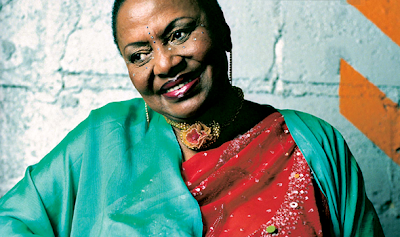 Written By: Staff Writer—On this date, one year ago, Miriam Makeba (born Zenzile Miriam Makeba) collapsed while on stage while singing her hit song Pata Pata for a concert organized to support writer Roberto Saviano in his stand against the Camorra, a mafia-like organization local to the Region of Campania, Italy. Makeba was taken to a clinic where doctors were unable to revive her.
Written By: Staff Writer—On this date, one year ago, Miriam Makeba (born Zenzile Miriam Makeba) collapsed while on stage while singing her hit song Pata Pata for a concert organized to support writer Roberto Saviano in his stand against the Camorra, a mafia-like organization local to the Region of Campania, Italy. Makeba was taken to a clinic where doctors were unable to revive her. .
The beloved and iconic Makeba was well known throughout the world as Mama Africa for her heartfelt songs about the continent as well as her dedication to the struggles of African people. "You sing about those things that surround you," she said. "Our surrounding has always been that of suffering from apartheid and the racism that exists in our country. So our music has to be affected by all that."
.
Makeba's singing career started in the 1950s as she mixed jazz with traditional South African songs. She came to international attention in 1959 during a tour of the United States with South African group the Manhattan Brothers. She was forced into exile soon after when her passport was revoked after starring in an anti-apartheid documentary and did not return to her native country until after Nelson Mandela was released from prison in 1990. As MIMI writer Joké Babington-Ashaye, wrote in the article Rebel Artists And Politics: Beating The Drums Of War (originally published in March 2006):
For 31 years she lived in forced exile as "a citizen of the world.” With her strong voice and heartfelt lyrics the woman also known as Mama Africa ... used her voice as an instrument against injustice. Singing in several different languages Mariam Makeba was very vocal against Apartheid regime in South Africa. The deciding change in her career path from a well liked local singer to an international advocate for human rights was her appearance and performance in the Anti-Apartheid film Come Back Africa. The film won awards and after her testimony about apartheid in front of the United Nations, she was officially banned from returning to South Africa. Assisted by Harry Belafonte she obtained a visa and initially welcomed by the American Government she soon became a persona non grata after her involvement in the civil rights movement and her marriage to Black Panther leader Stokely Carmichael. The couple fled to Guinea, when President Sékou Touré issued Makeba with a diplomatic passport. Makeba did face criticism some years later for her seeming silence in the face of human rights violations which occurred in Guinea during Touré’s reign. From Guinea she started out on her tours the most famous being Paul Simon's Graceland tour. She used the stage as a platform to fight for a unified Africa and fight against racism. She appeared twice as ambassador extraordinary in front of the UNO General Assembly and fulfilled further diplomatic missions.
In a league of her own, Makeba (the first black African woman to win a Grammy Award, which she shared with Harry Belafonte in 1965) is oftentimes cited as an inspiration to artists and civil rights leaders alike. As Nelson Mandela shared in a tribute to Makeba following her passing: "Her haunting melodies gave voice to the pain of exile and disclocation which she felt for 31 long years. At the same time, her music inspired a powerful sense of hope in all of us. Even after she returned home she continued to use her name to make a difference by mentoring musicians and supporting struggling young women. One of her more recent projects was to highlight the plight of victims of land mines. She was South Africa's first lady of song and so richly deserved the title of Mama Afrika. She was a mother to our struggle and to the young nation of ours."
.
(Photo Credits: Courtesy Heads Up International)

 facebook
facebook twitter
twitter pinterest
pinterest


0 comments:
Post a Comment